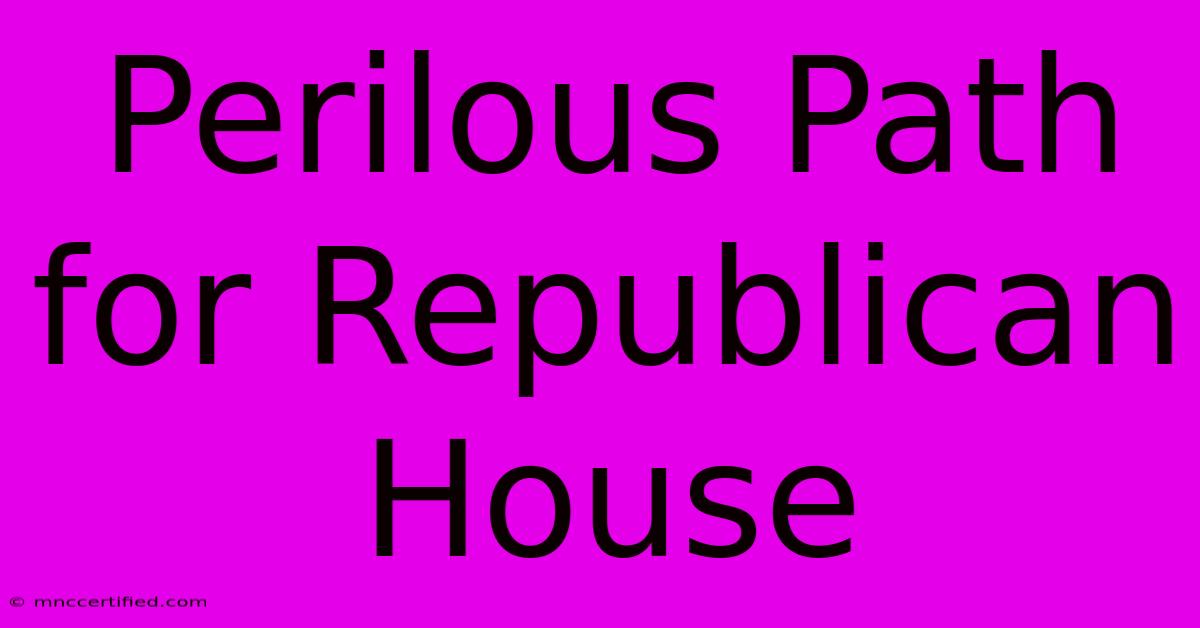Perilous Path For Republican House

Table of Contents
Perilous Path for Republican House: Navigating Internal Divisions and External Challenges
The Republican House majority faces a precarious path in the 118th Congress. A narrow margin of victory, coupled with significant internal divisions and mounting external pressures, creates a challenging landscape for achieving their legislative agenda. This article explores the key obstacles facing the GOP and analyzes their prospects for success.
Internal Divisions: A House Divided
The Republican party's internal fissures are perhaps their greatest hurdle. The party encompasses a diverse range of ideologies, from the more moderate to the staunchly conservative. This spectrum creates friction on crucial policy issues, hindering the ability to present a united front and pass legislation effectively.
The Freedom Caucus's Influence:
The House Freedom Caucus, a group of highly conservative Republicans, holds considerable sway, often pushing the party to the right. Their willingness to oppose leadership and threaten government shutdowns creates significant instability and complicates the passage of even relatively uncontroversial bills. This internal struggle for power significantly impacts the party's ability to govern effectively.
Trump's Shadow:
The enduring influence of former President Donald Trump continues to cast a long shadow over the Republican party. While he commands significant loyalty within the base, his pronouncements and endorsements can create discord and complicate the party's messaging and legislative strategy. This impact of Trump's influence is a key factor in predicting legislative success.
Moderate Republicans: A Necessary but Unreliable Vote:
Moderate Republicans, while essential for passing legislation in the narrowly divided House, are not always reliable votes. They may find themselves at odds with the more conservative elements of the party, leading to unpredictable outcomes and potential legislative defeats. The need for bipartisan support or cooperation with moderate Republicans is a constant challenge.
External Challenges: A Hostile Landscape
Beyond internal strife, external factors further complicate the Republicans' path.
Biden's Presidency: A Roadblock to the Agenda:
President Biden's Democratic administration represents a significant obstacle to the Republican agenda. A deeply divided Congress makes passing major legislation extremely difficult, requiring bipartisan compromise that is often elusive. The relationship between the Republican House and the Democratic White House will dictate much of the legislative progress.
The Senate's Democratic Control:
The Democratic-controlled Senate acts as a major check on the House's power. Even if the House manages to pass legislation, it faces an uphill battle to gain Senate approval, often requiring significant compromises that may not satisfy the Republican base. This Senate bottleneck is a significant constraint on Republican ambitions.
Public Opinion and the 2024 Elections:
Public opinion plays a crucial role. The Republicans' legislative agenda must navigate the complexities of public perception and approval ratings. Approaching the 2024 election cycle adds another layer of complexity, impacting both the party's legislative priorities and their willingness to compromise. The need to balance legislative goals with electoral strategy is a major factor.
The Path Forward: A Difficult Road
The Republican House faces a perilous path. Their success hinges on their ability to overcome internal divisions, navigate the hostile external environment, and forge bipartisan compromises where necessary. The coming years will be a test of their leadership and their ability to govern effectively in a highly polarized political climate. The future success of the Republican House depends on how effectively these challenges are addressed. Only time will tell if they can navigate these treacherous waters.

Thank you for visiting our website wich cover about Perilous Path For Republican House. We hope the information provided has been useful to you. Feel free to contact us if you have any questions or need further assistance. See you next time and dont miss to bookmark.
Featured Posts
-
Bellinger Traded To Yankees
Dec 18, 2024
-
Cavendish Family Life Wife And Kids
Dec 18, 2024
-
Diane Delano Northern Exposure Actress Dies At 67
Dec 18, 2024
-
Mudryks Suspension Chelseas Dilemma
Dec 18, 2024
-
Nissan And Honda In Merger Discussions
Dec 18, 2024